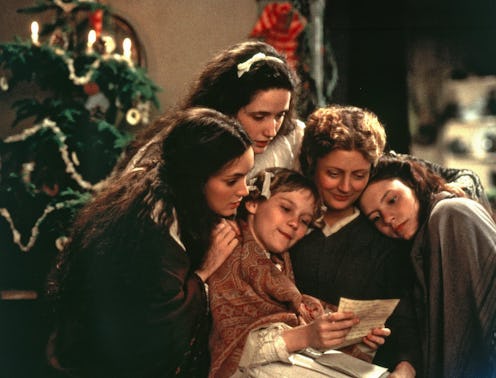
When I heard over the summer that The CW was remaking Louisa May Alcott’s Little Women into a TV series, my heart leapt for joy at hearing that one of my favorite books would be getting a new adaptation. But I immediately came back down to Earth after learning more details. As it turns out, the series is going to be a gritty, dystopian, hyper-stylized version of the novel, perhaps in the same vein as the recently adapted Pride and Prejudice and Zombies.
Thankfully, there are enough faithful Little Women film adaptations already out there to ease my worry. There’s the 1949 Elizabeth Taylor version and the 1933 Katharine Hepburn take, but my favorite happens to be the 1994 movie starring Susan Sarandon, Winona Ryder, Claire Danes, and Kirsten Dunst. Based on Alcott’s 1868 novel, Little Women tells the story of the four March sisters, who come of age in Concord, Massachusetts during and after the Civil War. There’s Meg, the eldest who fulfills the role expected of women at the time; Jo, the tomboy who dreams of being a writer; Beth, shy and musically talented, but often ill; and Amy, an artist who's also selfish and materialistic.
There are plenty of things to love about the film. The costumes and production design are intricately detailed, the story is inspiring, and the characters are well-developed. And there's the practically perfect cast, who act the hell out of their roles. (Sarandon is absolute perfection as March matriarch Marmie, and has Christian Bale ever been more adorable?) But here are some of the deeper reasons why, to this day, I watch 1994's Little Women over and over again.
1. It’s Profoundly Feminist
As the March sisters grow, a part of their self-reflection is rooted in what society demands of them as 19th century women, and they often end up challenging those expectations. The girls question neighbor and friend Theodore “Laurie” Laurence’s freedom to attend college, arguing that while he can "do what he likes" and “no one thinks the less of him,” women are not given that same respect. Marmie’s assertion that “Nothing provokes speculation more than the sight of a woman enjoying herself” subtly hints at female sexual repression, and Jo’s move to New York sparks an interest in supporting women’s right to vote. The girls all embrace feminism in their own ways, but its presence in the film is undeniable.
2. Marmie Was Way Ahead Of Her Time
When told that her daughters are “unusually active,” the March matriarch responds with a takedown of societal expectations of women, saying, “It is my opinion that young girls are no different from boys in their need for exertion. Feminine weakness and fainting spells are the direct result of confining young girls to the house bent over their needlework in restrictive corsets.” Mic drop.
3. It Emphasizes The Importance Of Helping Others, Even When You Have Little
As a result of the war and their refusal to benefit from slavery, the Marches find themselves transitioning from a wealthy household (called "one of our finest families" by Mr. Laurence early on) into relative poverty. But their newfound hardship doesn’t stop them from helping others. Despite not having had a substantial meal in quite a while, the group still donates their entire Christmas breakfast to a poor family new to town and continues to help the poor throughout the film.
4. It Inspires The Cultivation Of Imagination
The March girls adapt to their lack of material things and instead nurture their imaginations up in the attic. There, they take part in the Pickwick Press, a mock newspaper for which they each write stories. They create secret societies, put on plays, and don elaborate costumes to feed their fantastical hunger and make use of their imaginative minds.
5. It Places Personality Over Physical Beauty
Marmie scolds Amy for being “more intent on reshaping your dear little nose than refashioning your character.” Indeed, she spends much of the story reminding her daughters that outer beauty is less important than one’s character. “I only care what you think of yourself,” she tells Meg. “If you feel your value lies in being merely decorative, I fear that someday you might find yourself thinking that’s all that you really are. Time erodes all such beauty, but the one thing it cannot diminish is the wonderful workings of your mind, your humor, your kindness, and your moral courage.”
6. It Has Hints Of Quaker Values
I spent 12 years of my life attending a Quaker school where lessons included the importance of service, simplicity, and non-violent conflict resolution. Though I don’t practice any specific religion today, I keep those lessons close and try to incorporate Quaker sensibilities into my modern life. The March family’s regularity in helping others, acceptance of simplicity in their lives, and Marmie’s insistence that “We must not embrace violence” reflect the budding spread of Quakerism throughout the country. They even sing a song popular with Quakers at Meg’s wedding.
7. It Knows That Love Comes Before Money
Though Amy asserts that she’s always known she’d never marry a poor man, the March sisters are encouraged to look beyond a man’s wealth or prospects and accept that love comes in different packages, rich or poor. As a result, the girls are able to find love in their own ways: some fall for rich men, some fall for poor men, but all fall go after romance in their own ways.
8. The Music Is Gorgeous
Long after the film ends, the gorgeous score by Thomas Newman echoes in my head. Close your eyes and give the main theme a listen.
It's been over two decades since its release, but Little Women continues to be a major part in my life, and that of fans everywhere.
Images: Columbia Pictures, Giphy